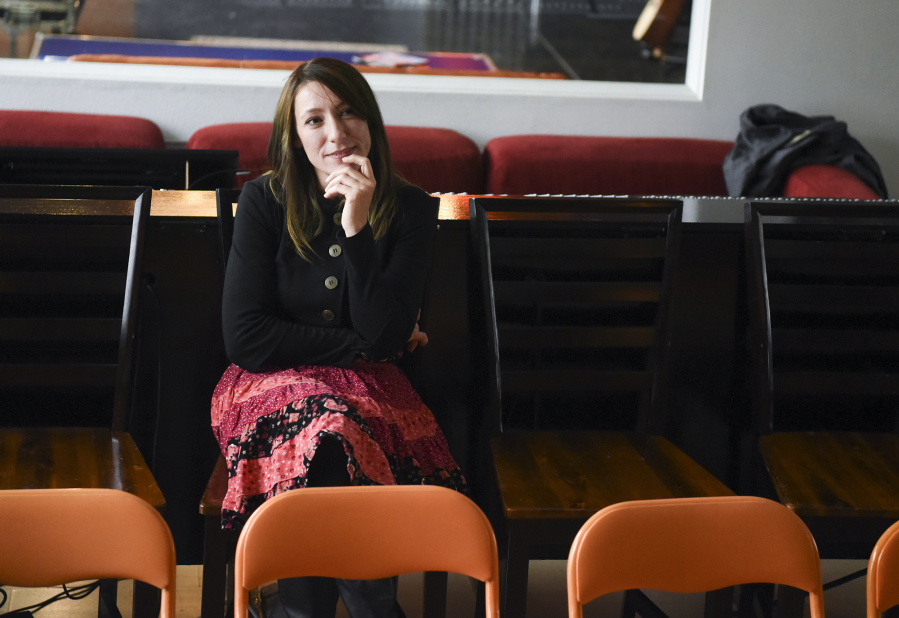When the piglike Xiao Chou starts stalking the perfect orchid, the tall flower immediately leaps to life and evades him — dancing, teasing, disappearing from here and popping up there, eventually smacking Xiao Chou smartly on his porky nose. It’s not very floral behavior, but this uniquely gifted orchid has trained at physical acting school.
Later on, when a huge dragon emerges and breathes harmless “fire” from a tank of carbon dioxide, performer Patrick Stagaman said, children in the front row regularly scream with fear and delight.
That’s been happening for decades. “I used to watch this show at age 3, and I would run out screaming,” said Emily Alexander.
Clearly “The Toad Prince” is nothing new — although Stagaman and fellow puppet performer Laura Loy did get a chance to read and tweak a script that’s been around for decades. That script, based on a Chinese folk tale, was penned by the late Reg Bradley, who founded Tears of Joy Theatre with his wife, Janet, in Hawaii in 1971.
That was before current executive director Emily Alexander, the Bradleys’ youngest child, was born. Her parents were ministering in Hawaii and looking to reach out to local youth, she said; they staged a puppet show called “The Courageous Dragon,” which reportedly captivated the children so much, it set their unexpected new direction in life: puppet theater.
Janet Bradley was a high school history teacher who believed strongly in sharing folk legends and indigenous stories across boundaries as a way of teaching and endorsing diversity, Alexander said. That mission became especially important as Tears of Joy, which launched as a nonprofit company in Vancouver, started sending teams of puppeteers out on tours of tiny schools and community centers in Idaho, Montana and other rural outposts across the nation.
Not only are those places lacking in diversity, Alexander said — many are lacking any theatrical opportunities whatsoever. Even some of the teachers who welcome Tears of Joy performances to their schools admit that they’ve never seen a live-on-stage show before, she said.
“This is a great way to be exposed to other cultures and learn to accept other people,” Alexander said. “Unfortunately, when budgets are tight, the first thing that goes is money for the arts in schools.”
Return to Vancouver
Formally launched from family farmland in northeast Vancouver decades ago, Alexander said, Tears of Joy has been both a success story and a struggle since then. “Any theater is difficult to run, but this one is so specialized,” she said.
The company has hopped all over Vancouver and Portland for years, and got taken over by non-family directors after its founders divorced, and Janet Bradley died; when Alexander, who grew up in the company but then went on to run her own arts preschool, heard that Tears of Joy was about to go under, she dropped everything and became the new executive director.
That was two years ago; since then, she said, she’s made the “brutal” decisions about staffing and other budget cuts that the board couldn’t bring itself to make. That’s meant not staging anything brand new, but reviving classic shows and puppets that have been in storage for years. The puppets and stage sets in “The Frog Prince” are creations that Alexander’s parents made with their own hands, she said. (And, she added, Reg Bradley recently died of idiopathic pulmonary fibrosis, a lung disease; she believes it was caused by all the fiberglass dust he inhaled while building hundreds of puppets.)
It’s also meant giving up on grown-up ticket prices and expensive-to-rent Portland venues in favor of another affordable family connection. Alexander’s husband, Carl Hinds, is the owner of the Hammersmith Rock Institute, a “school of rock” in east Vancouver that offers music lessons and recording opportunities — and will host Tears of Joy’s local performances in its intimate, 35-seat theater. Performances of “The Toad Prince” today and Nov. 19 are the official launch of Tears of Joy shows at this new location.
If You Go
What: “The Toad Prince,” by Tears of Joy Theatre.
When: 7 p.m. today; 2 p.m. Nov. 19.
Where: Hammersmith Rock Institute, 17030 S.E. 1st St., Suite 106, Vancouver.
Cost: $10; free for those under 12 months old.
Info: www.facebook.com/tearsofjoytheatre
Tears of Joy still maintains an office and some storage space on Portland’s Southeast Hawthorne Boulevard, Alexander said — but, “it’s so hard to make it in Portland now. You have to have friends.” Or a husband with the right real estate, she added.
On the road
You can call Loy and Stagaman puppeteers, but that doesn’t really cover it. They’re actors, dancers, clowns — all-around “physical performers” who learned the craft of telling stories with their bodies at the Dell’Arte International School of Physical Theater in Blue Lake, Calif. “Over the years, we’ve hired dozens of their graduates,” Alexander said.
The duo is on the road for days or weeks at a time, they said, and often stay in Airbnb accommodations so they can cook for themselves and avoid motel burnout. Still, this touring puppet show is driven, deadline work, with the team often booked to do two shows at two different schools each day. That requires pretty rapid set construction and deconstruction for each show — with a 45-minute performance sandwiched in between.
It’s a high-burnout job, Alexander acknowledged. “It’s a really fancy internship,” she said.
But working full time as a puppet-theater performer is a rare opportunity, Loy said. “The kids are so intrigued” at being encouraged to laugh, cry and gasp out loud, she said. They learn there are no screens and this isn’t a video; everything is live, personal and (almost) real.
“At some of these schools in the middle of nowhere,” she said, “we are teaching them about theater for the first time.”




